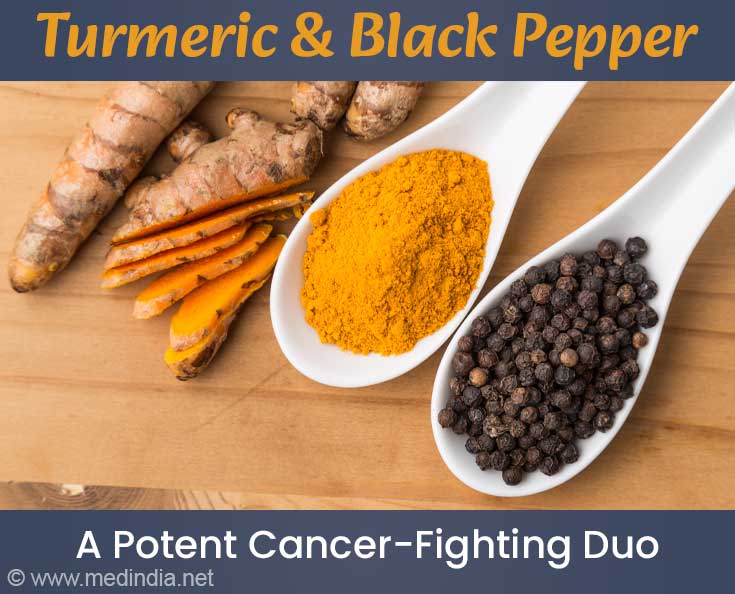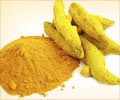- Spices for Prevention and Treatment of Cancers - (https://www.semanticscholar.org/paper/Spices-for-Prevention-and-Treatment-of-Cancers-Zheng-Zhou/5449233280112f6aaafbb2bbac1e7956c315f333#)
- Curcumin induces apoptosis through the mitochondria-mediated apoptotic pathway in HT-29 cells - (https://pubmed.ncbi.nlm.nih.gov/19235267/)
- Thymoquinone extracted from black seed triggers apoptotic cell death in human colorectal cancer cells via a p53-dependent mechanism - (https://pubmed.ncbi.nlm.nih.gov/15375533/)
- [6]-Gingerol Suppresses Oral Cancer Cell Growth by Inducing the Activation of AMPK and Suppressing the AKT/mTOR Signaling Pathway - (https://pubmed.ncbi.nlm.nih.gov/34697150/)
- The Promise of Piperine in Cancer Chemoprevention. Cancers (Basel) - (https://pubmed.ncbi.nlm.nih.gov/38001748/)
- Clinical effects of curcumin in enhancing cancer therapy: A systematic review - (https://bmccancer.biomedcentral.com/counter/pdf/10.1186/s12885-020-07256-8.pdf)
- Toxicity of Saffron Extracts on Cancer and Normal Cells: A Review Article - (https://pubmed.ncbi.nlm.nih.gov/32711409/)
About
For centuries, spices have been an integral part of human culture- not just for their culinary appeal but also for their medicinal properties. Ancient civilizations recognized the healing potential of spices, using them in traditional remedies to treat a variety of ailments. Modern scientific research now validates these historical beliefs, revealing that certain spices contain bioactive compounds that may help in preventing and treating cancer.
Several spices, including turmeric, black cumin, ginger, garlic, saffron, black pepper, and chili pepper, have shown promising effects against cancers such as lung, liver, breast, stomach, colorectal, cervical, and prostate cancers(1✔ ✔Trusted Source
Spices for Prevention and Treatment of Cancers
Go to source). Their potent compounds- curcumin, thymoquinone, piperine, and capsaicin - exhibit antioxidant, anti-inflammatory, and immunomodulatory properties, making them valuable in cancer research.
Did You Know?
Black pepper boosts turmeric absorption by 2000%, making their combination a powerful duo for health! #cancer #spicepower #healthboost #medindia
How Do Spices Help Fight Cancer?
Spices work against cancer in multiple ways. The key mechanisms include:
Inducing Apoptosis (Cell Death)
Apoptosis is the process of programmed cell death that eliminates damaged or abnormal cells. Cancer cells often evade this process, allowing them to multiply uncontrollably. Curcumin (from turmeric), thymoquinone (from black cumin), and capsaicin (from chili peppers) have been found to trigger apoptosis, effectively slowing down tumor growth(2✔ ✔Trusted Source
Curcumin induces apoptosis through the mitochondria-mediated apoptotic pathway in HT-29 cells
Go to source, 3✔ ✔Trusted Source
Thymoquinone extracted from black seed triggers apoptotic cell death in human colorectal cancer cells via a p53-dependent mechanism
Go to source).
Inhibiting Tumor Growth & Spread
Some bioactive compounds in spices can reduce tumor proliferation, preventing cancer cells from dividing and spreading. Gingerol (from ginger) and piperine (from black pepper) interfere with cancer cell signaling pathways, limiting their ability to grow and invade other tissues(4✔ ✔Trusted Source
[6]-Gingerol Suppresses Oral Cancer Cell Growth by Inducing the Activation of AMPK and Suppressing the AKT/mTOR Signaling Pathway
Go to source, (5✔ ✔Trusted Source
The Promise of Piperine in Cancer Chemoprevention. Cancers (Basel)
Go to source).
Enhancing the Effects of Chemotherapy and Radiation Therapy
Spices may also help make conventional cancer treatments more effective. Studies show that curcumin and piperine can make cancer cells more sensitive to chemotherapy and radiation(6✔ ✔Trusted Source
Clinical effects of curcumin in enhancing cancer therapy: A systematic review
Go to source), potentially improving treatment outcomes and reducing resistance to drugs.
Reducing Inflammation and Oxidative Stress
Chronic inflammation and oxidative stress are major contributors to cancer development. Garlic, saffron, and turmeric contain powerful antioxidants that neutralize harmful free radicals, reducing DNA damage and lowering the risk of cancer formation(1✔ ✔Trusted Source
Spices for Prevention and Treatment of Cancers
Go to source, 7✔ ✔Trusted Source
Toxicity of Saffron Extracts on Cancer and Normal Cells: A Review Article
Go to source).
Boosting the Immune System
The immune system plays a critical role in identifying and eliminating cancerous cells. Spices such as black cumin and turmeric enhance immune function, helping the body fight cancer more effectively.

Spices with Cancer-Fighting Potential
Turmeric (Curcuma longa)
- Active Compound: Curcumin
- Benefits: Anti-inflammatory, antioxidant, induces apoptosis, and enhances chemotherapy efficacy.
- Common Uses: Added to curries, teas, and golden milk.
Black Cumin (Nigella sativa)
- Active Compound: Thymoquinone
- Benefits: Immunomodulatory, anti-cancer, and protects against oxidative stress.
- Common Uses: Used in Middle Eastern and South Asian cuisine, and consumed as an oil or supplement.
Ginger (Zingiber officinale)
- Active Compound: Gingerol
- Benefits: Inhibits cancer cell growth and has strong anti-inflammatory effects.
- Common Uses: Added to teas, soups, and stir-fries.
Garlic (Allium sativum)
- Active Compound: Allicin
- Benefits: Reduces tumor formation, fights infections, and boosts immune function.
- Common Uses: Used in savory dishes, raw or cooked.
Saffron (Crocus sativus)
- Active Compound: Crocin and Safranal
- Benefits: Potent antioxidant, protects DNA from damage, and may slow tumor growth.
- Common Uses: Used in desserts, rice dishes, and teas.
Black Pepper (Piper nigrum)
- Active Compound: Piperine
- Benefits: Enhances absorption of curcumin, slows tumor spread, and fights inflammation.
- Common Uses: Sprinkled on dishes, often paired with turmeric.
Chili Pepper (Capsicum annum)
- Active Compound: Capsaicin
- Benefits: Induces apoptosis, reduces inflammation, and slows tumor invasion.
- Common Uses: Found in spicy dishes and sauces.
Incorporating these spices into your daily diet may provide a natural way to enhance health and reduce cancer risk. While they are not a replacement for medical treatments, they serve as powerful complementary tools in cancer prevention and management. As research continues, the potential of spices in oncology grows, making them an exciting field of study in modern medicine.









